change wheel Citroen BERLINGO MULTISPACE 2016 2.G Owner's Manual
[x] Cancel search | Manufacturer: CITROEN, Model Year: 2016, Model line: BERLINGO MULTISPACE, Model: Citroen BERLINGO MULTISPACE 2016 2.GPages: 296, PDF Size: 10.36 MB
Page 19 of 296
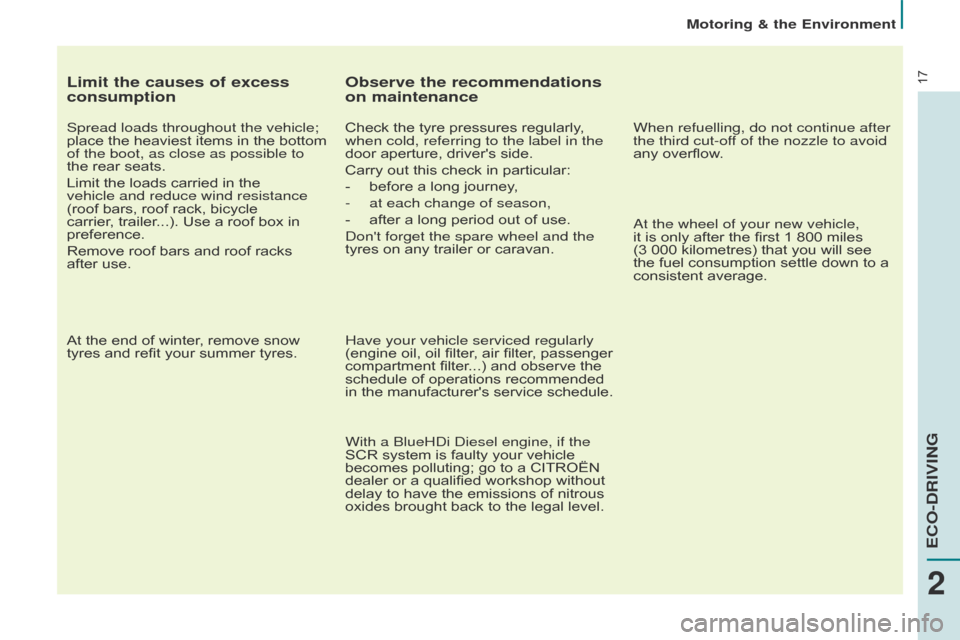
17
Motoring & the Environment
Berlingo-2-VP_en_Chap02_eco-conduite_ed01-2016
Limit the causes of excess
consumption
Spread loads throughout the vehicle;
place the heaviest items in the bottom
of the boot, as close as possible to
the
rear seats.
Limit
the loads carried in the
vehicle and reduce wind resistance
(roof
bars, roof rack, bicycle
carrier
, trailer...). Use a roof box in
preference.
Remove
roof bars and roof racks
after
use.
At
the end of winter, remove snow
tyres
and refit your summer tyres.
Observe the recommendations
on maintenance
Check the tyre pressures regularly, when cold, referring to the label in the
door aperture, driver's side.
Carry
out this check in particular:
-
before
a long journey,
-
at each change of season,
-
after
a long period out of use.
d
on't forget the spare wheel and the
tyres
on any trailer or caravan.
Have your vehicle serviced regularly
(engine
oil, oil filter, air filter, passenger
compartment
filter...) and observe the
schedule
of operations recommended
in
the manufacturer's service schedule.
With a BlueH
d i d iesel engine, if the
SCR
system is faulty your vehicle
becomes
polluting; go to a CITROËN
dealer
or a qualified workshop without
delay
to have the emissions of nitrous
oxides
brought back to the legal level.When refuelling, do not continue after
the third cut-off of the nozzle to avoid
any
overflow.
a
t the wheel of your new vehicle,
it
is only after the first 1 800 miles
(3 000
kilometres) that you will see
the
fuel consumption settle down to a
consistent
average.
2
ECO-DRIVING
Page 45 of 296
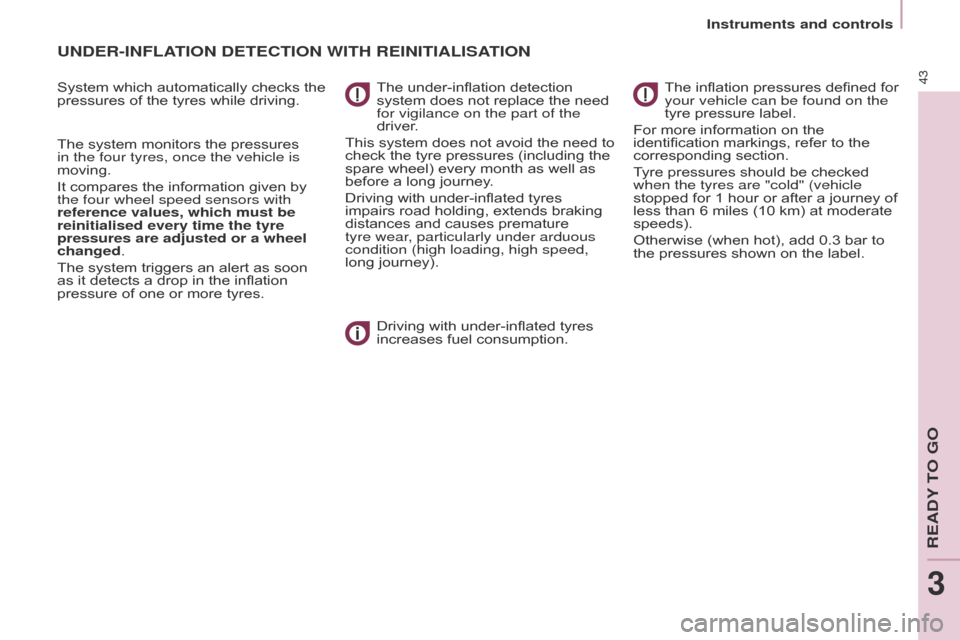
43
Berlingo-2-VP_en_Chap03_Pret-a-partir_ed01-2016
Instruments and controls
UNDER-INFLATION DETECTION WITH REINITIALISATION
System which automatically checks the pressures of the tyres while driving.
The
system monitors the pressures
in the four tyres, once the vehicle is
moving.
It
compares the information given by
the four wheel speed sensors with
reference values, which must be
reinitialised every time the tyre
pressures are adjusted or a wheel
changed
.
The
system triggers an alert as soon
as
it detects a drop in the inflation
pressure
of one or more tyres. The under-inflation detection system
does not replace the need
for vigilance on the part of the
driver
.
This
system does not avoid the need to
check
the tyre pressures (including the
spare
wheel) every month as well as
before
a long journey.
Driving
with under-inflated tyres
impairs
road holding, extends braking
distances
and causes premature
tyre wear
, particularly under arduous
condition (high loading, high speed,
long
journey).
Driving
with under-inflated tyres
increases
fuel consumption.The
inflation pressures defined for your vehicle can be found on the
tyre
pressure label.
For
more information on the
identification
markings, refer to the
corresponding
section.
Tyre
pressures should be checked
when the tyres are "cold" (vehicle
stopped
for 1 hour or after a journey of
less
than 6 miles (10 km) at moderate
speeds).
Otherwise
(when hot), add 0.3 bar to
the
pressures shown on the label.
REadY To Go
3
Page 51 of 296
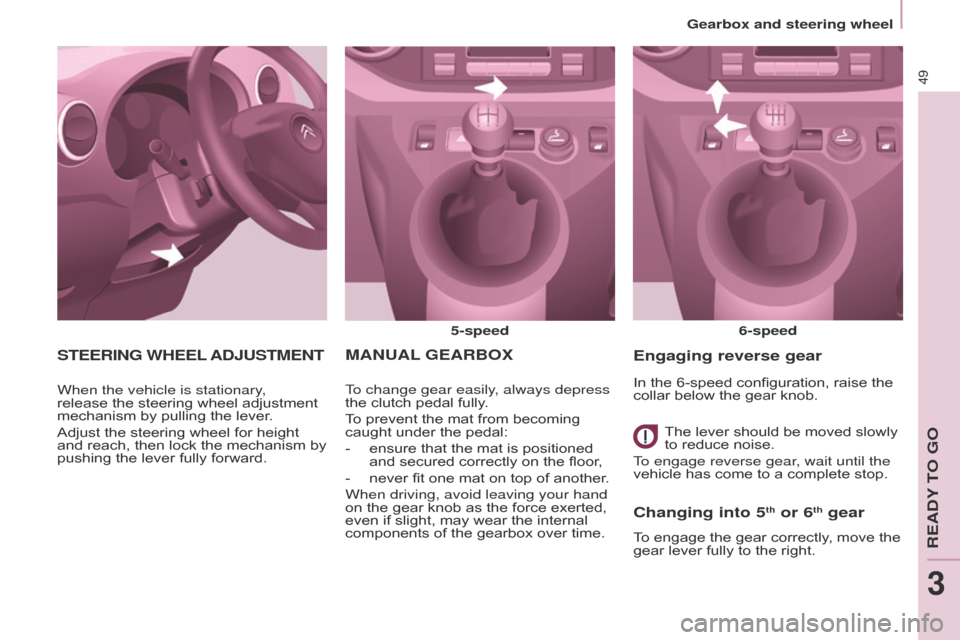
49
Berlingo-2-VP_en_Chap03_Pret-a-partir_ed01-2016
MANUAL GEARBO x
5-speed
6-speed
To change gear easily, always depress
the
clutch
pedal fully.
To
prevent
the
mat from becoming
caught
under
the pedal:
-
ensure
that
the mat is positioned
and
secured correctly on the floor,
-
never
fit
one mat on top of another.
When driving, avoid leaving your hand
on
the
gear
knob as the force exerted,
even
if
slight,
may wear the internal
components
of
the gearbox over time.
Changing into 5th or 6th gear
To engage the gear correctly, move the gear lever fully to the right.
Engaging reverse gear
The lever should be moved slowly to reduce noise.
To engage reverse gear, wait until the
vehicle
has come to a complete stop.
STEERING WHEEL ADJUSTMENT
When the vehicle is stationary,
release
the steering wheel adjustment
mechanism
by pulling the lever.
Adjust
the steering wheel for height
and
reach, then lock the mechanism by
pushing
the lever fully forward. In
the 6-speed configuration, raise the collar
below the gear knob.
REadY To Go
3
Gearbox and steering wheel
Page 52 of 296
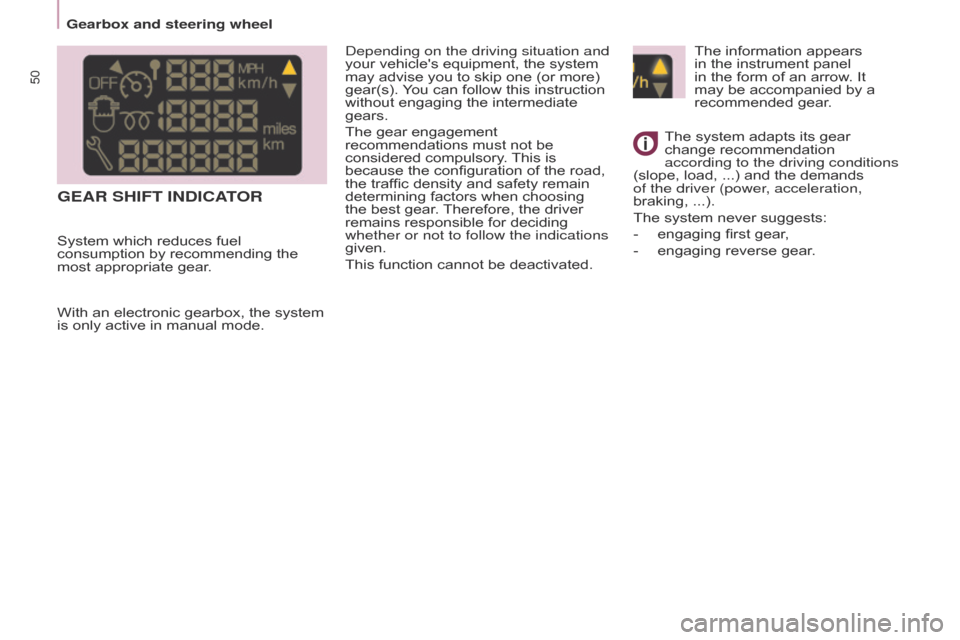
50
Berlingo-2-VP_en_Chap03_Pret-a-partir_ed01-2016
The information appears in the instrument panel
in
the form of an arrow. It
may
be accompanied by a
recommended
gear.
The
system adapts its gear
change
recommendation
according to the driving conditions
(slope,
load, ...) and the demands
of the driver (power
, acceleration,
braking, ...).
The
system never suggests:
-
engaging
first gear,
-
engaging
reverse gear.
With
an
electronic
gearbox,
the
system
is
only
active
in
manual
mode.
GEAR SHIFT INDICATOR
depending on the driving situation and
your vehicle's equipment, the system
may
advise you to skip one (or more)
gear(s).
Y
ou can follow this instruction
without
engaging the intermediate
gears.
The
gear engagement
recommendations
must not be
considered
compulsory.
This
is
because
the configuration of the road,
the
traffic density and safety remain
determining
factors when choosing
the
best gear.
Therefore,
the driver
remains
responsible for deciding
whether or not to follow the indications
given.
This
function cannot be deactivated.
System
which
reduces
fuel
consumption
by
recommending
the
most
appropriate
gear.
Gearbox and steering wheel
Page 53 of 296
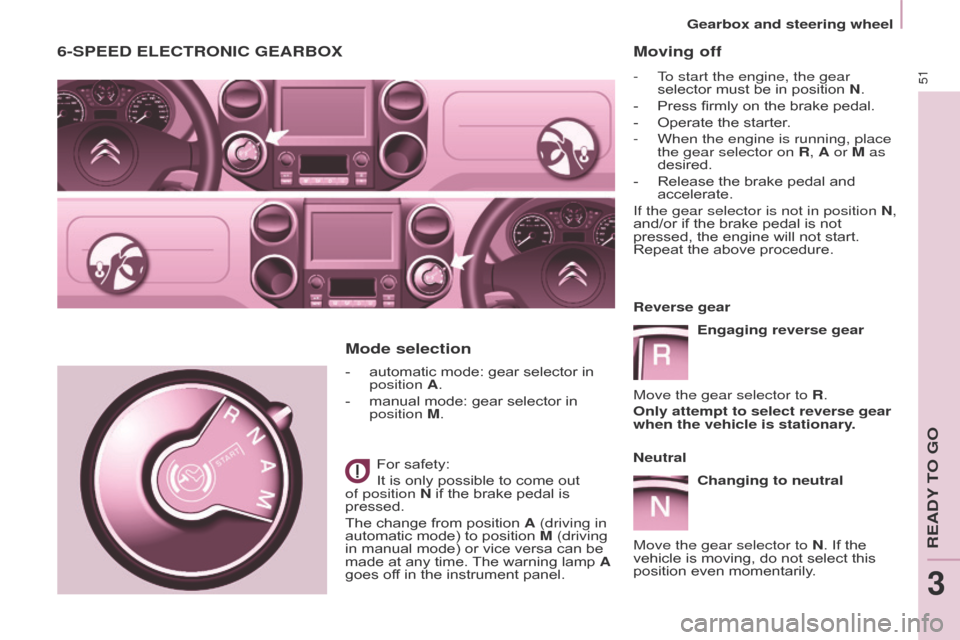
51
Berlingo-2-VP_en_Chap03_Pret-a-partir_ed01-2016
6-SPEED ELECTRONIC GEARBOx
- automatic mode: gear selector in position
A.
-
manual
mode: gear selector in
position
M.
For
safety:
It
is only possible to come out
of position
N if the brake pedal is
pressed.
The
change from position A (driving in
automatic
mode) to position M (driving
in
manual mode) or vice versa can be
made
at any time.
The
warning lamp A
goes
off in the instrument panel.
Mode selection Moving off
- To start the engine, the gear
selector must be in position N.
-
Press
firmly on the brake pedal.
-
Operate
the starter.
-
When the engine is running, place
the gear selector on
R, A or M as
desired.
-
Release
the brake pedal and
accelerate.
If the gear selector is not in position
N,
and/or
if the brake pedal is not
pressed,
the engine will not start.
Repeat
the above procedure.
Reverse gear Engaging reverse gear
Move the gear selector to R.
Only attempt to select reverse gear
when the vehicle is stationary.
Neutral Changing to neutral
Move the gear selector to N.
If the
vehicle
is moving, do not select this
position
even momentarily.
REadY To Go
3
Gearbox and steering wheel
Page 54 of 296
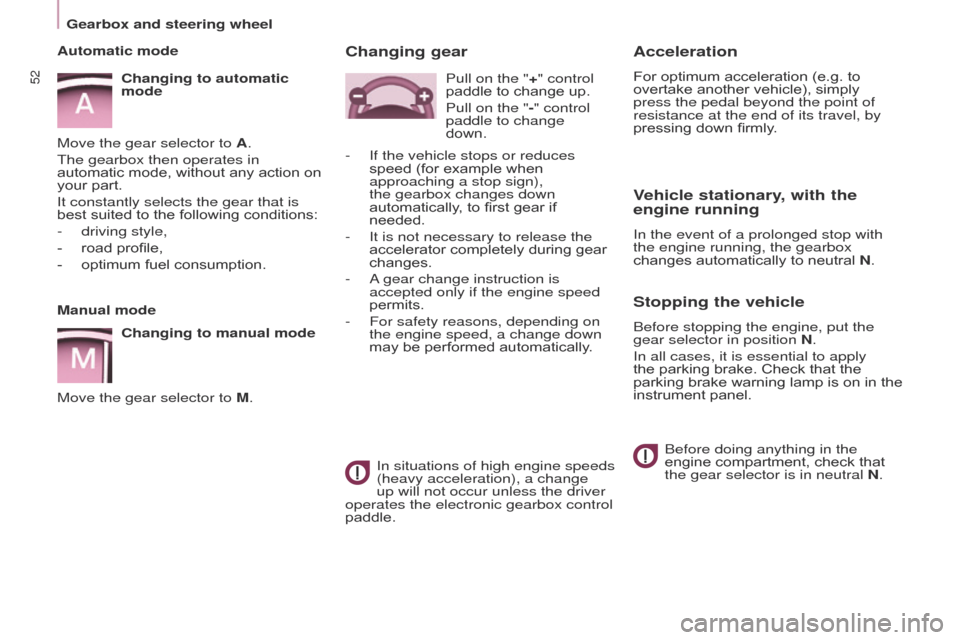
52
Berlingo-2-VP_en_Chap03_Pret-a-partir_ed01-2016
Acceleration
For optimum acceleration (e.g. to overtake another vehicle), simply
press the pedal beyond the point of
resistance at the end of its travel, by
pressing
down firmly.
Vehicle stationary, with the
engine running
In the event of a prolonged stop with
the engine running, the gearbox
changes automatically to neutral N.
Stopping the vehicle
Before stopping the engine, put the
gear selector in position N.
In all cases, it is essential to apply
the
parking brake. Check that the
parking
brake warning lamp is on in the
instrument
panel.
Before doing anything in the
engine
compartment, check that
the gear selector is in neutral
N.
Changing gear
In situations of high engine speeds
(heavy acceleration), a change
up will not occur unless the driver
operates the electronic gearbox control
paddle. Pull on the "+" control
paddle
to change up.
Pull on the "-" control
paddle to change
down.
-
If the vehicle stops or reduces
speed
(for example when
approaching a stop sign),
the gearbox changes down
automatically
, to first gear if
needed.
-
It is not necessary to release the
accelerator
completely during gear
changes.
-
a
gear change instruction is
accepted only if the engine speed
permits.
-
For safety reasons, depending on
the engine speed, a change down
may
be performed automatically.
Manual mode
Changing to manual mode
Move the gear selector to M. Automatic mode Changing to automatic
mode
Move the gear selector to A.
The gearbox then operates in
automatic
mode,
without
any
action
on
your
part.
It constantly selects the gear that is
best
suited
to
the
following
conditions:
-
driving style,
-
road
profile,
-
optimum
fuel
consumption.
Gearbox and steering wheel
Page 57 of 296
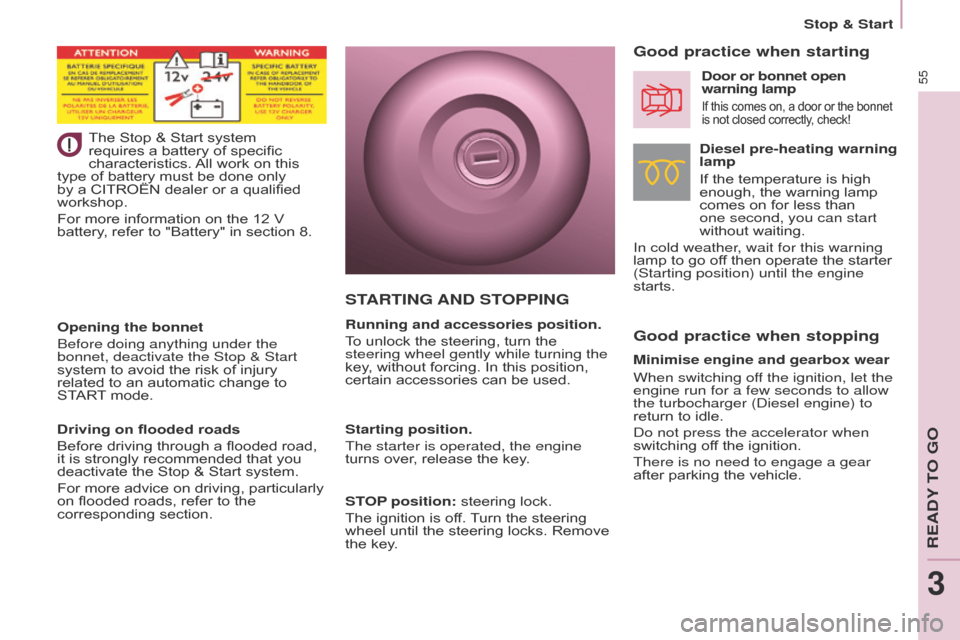
55
Berlingo-2-VP_en_Chap03_Pret-a-partir_ed01-2016
The Stop & Start system requires a battery of specific
characteristics.
All
work on this
type
of battery must be done only
by
a
CITROËN dealer or a qualified
workshop.
For
more information on the 12 V
battery
, refer to "Battery" in section 8.
Good practice when stopping Good practice when starting
Diesel pre-heating warning
lamp
If the temperature is high
enough,
the warning lamp
comes
on for less than
one
second, you can start
without
waiting.
In cold weather, wait for this warning
lamp
to
go off then operate the starter
(Starting position) until the engine
starts.Door or bonnet open
warning lamp
If this comes on, a door or the bonnet is not closed correctly, check!
Minimise engine and gearbox wear
When switching off the ignition, let the
engine run for a few seconds to allow
the turbocharger (
d iesel engine) to
return
to idle.
d
o not press the accelerator when
switching
off the ignition.
There is no need to engage a gear
after
parking the vehicle.
STARTING AND ST OPPING
Running and accessories position.
To
unlock the steering, turn the
steering wheel gently while turning the
key
, without forcing. In this position,
certain
accessories can be used.
Starting position.
The starter is operated, the engine
turns
over, release the key.
STOP position:
steering lock.
The
ignition is off.
T
urn the steering
wheel
until the steering locks. Remove
the
key.
Opening the bonnet
Before doing anything under the
bonnet, deactivate the Stop & Start
system
to
avoid
the
risk
of
injury
related
to
an
automatic
change
to
ST
ART
mode.
Driving on flooded roads
Before
driving
through
a
flooded
road,
it
is
strongly
recommended
that
you
deactivate
the
Stop
&
Start
system.
For
more
advice
on
driving,
particularly
on
flooded
roads,
refer
to
the
corresponding
section.
REadY To Go
3
Stop & Start
Page 154 of 296
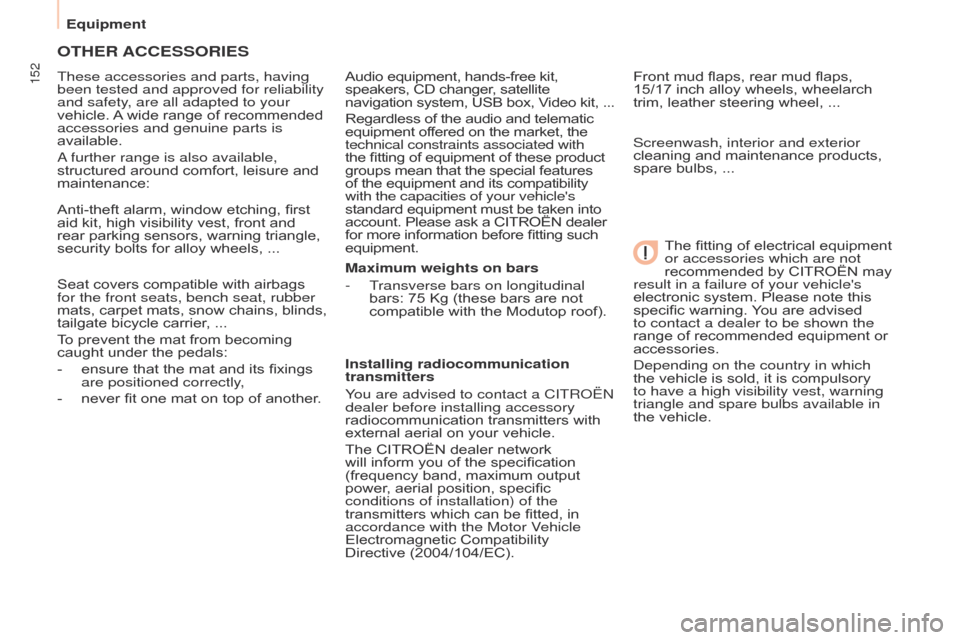
152
Berlingo-2-VP_en_Chap06_accessoire_ed01-2016
Equipment
OTHER ACCESSORIES
These accessories and parts, having
been tested and approved for reliability
and safety, are all adapted to your
vehicle.
A
wide range of recommended
accessories and genuine parts is
available.
a further range is also available,
structured
around comfort, leisure and
maintenance:
Anti-theft
alarm, window etching, first
aid
kit, high visibility vest, front and
rear
parking sensors, warning triangle,
security
bolts for alloy wheels, ...
Seat
covers compatible with airbags
for the front seats, bench seat, rubber
mats,
carpet
mats,
snow
chains,
blinds,
tailgate
bicycle carrier, ...
To
prevent the mat from becoming
caught
under the pedals:
-
ensure
that the mat and its fixings
are positioned correctly
,
-
never
fit one mat on top of another.Audio
equipment, hands-free kit, speakers,
CD changer, satellite navigation
system,
USB
box,
V
ideo
kit,
...
Regardless
of the audio and telematic
equipment
offered on the market, the
technical constraints associated with
the
fitting of equipment of these product
groups
mean that the special features
of
the equipment and its compatibility
with the capacities of your vehicle's
standard
equipment must be taken into
account.
Please ask a CITROËN dealer
for
more information before fitting such
equipment.
Maximum weights on bars
-
T
ransverse bars on longitudinal
bars:
75 Kg (these bars are not
compatible
with the Modutop roof).
Installing radiocommunication
transmitters
You are advised to contact a CITR
o Ë n
dealer before installing accessory
radiocommunication
transmitters with
external
aerial on your vehicle.
The
CITROËN dealer network
will
inform you of the specification
(frequency
band, maximum output
power
, aerial position, specific
conditions of installation) of the
transmitters
which can be fitted, in
accordance with the Motor V
ehicle
Electromagnetic
Compatibility
Directive (2004/104/EC).Front
mud flaps, rear mud flaps, 15/17 inch
alloy wheels, wheelarch
trim,
leather steering wheel, ...
Screenwash, interior and exterior
cleaning
and maintenance products,
spare
bulbs, ...
The
fitting of electrical equipment
or accessories which are not
recommended
by CITROËN may
result in a failure of your vehicle's
electronic
system. Please note this
specific
warning.
Y
ou are advised
to contact a dealer to be shown the
range
of recommended equipment or
accessories.
d
epending on the country in which
the
vehicle is sold, it is compulsory
to have a high visibility vest, warning
triangle and spare bulbs available in
the
vehicle.
Page 174 of 296
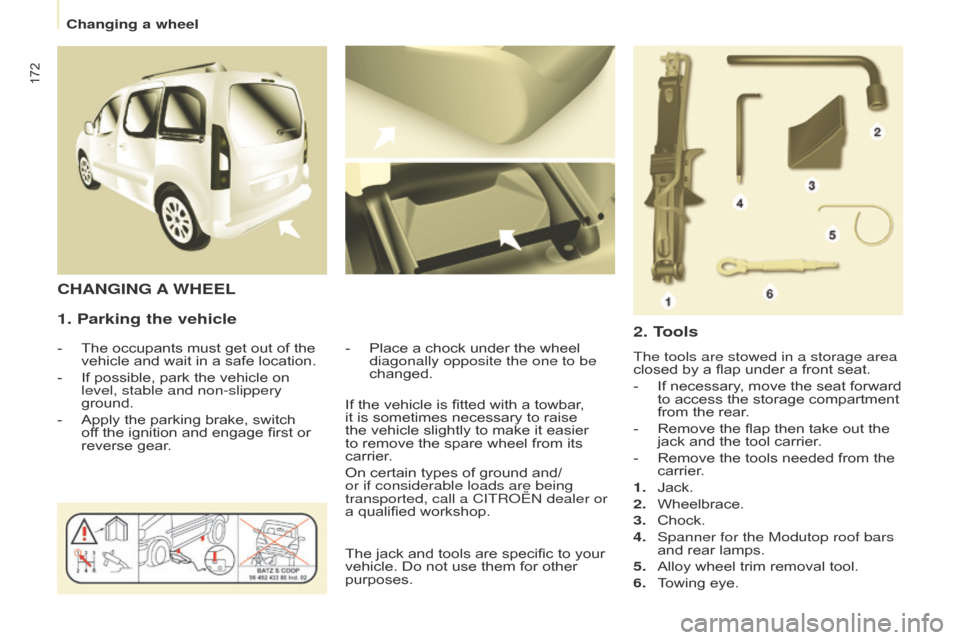
172
Berlingo-2-VP_en_Chap08_aide-rapide_ed01-2016
1. Parking the vehicle
- The occupants must get out of the vehicle
and wait in a safe location.
-
If
possible, park the vehicle on
level, stable and non-slippery
ground.
-
Apply
the parking brake, switch
of
f the ignition and engage first or
reverse
gear. -
Place a chock under the wheel diagonally opposite the one to be
changed.
CHANGING A WHEEL
2. T
ools
The tools are stowed in a storage area
closed by a flap under a front seat.
-
If
necessary, move the seat forward
to
access the storage compartment
from
the rear.
-
Remove
the flap then take out the
jack
and the tool carrier.
-
Remove
the tools needed from the
carrier
.
1.
Jack.
2.
Wheelbrace.
3.
Chock.
4.
Spanner for the Modutop roof bars
and
rear lamps.
5.
Alloy
wheel trim removal tool.
6.
T
owing eye.
If
the
vehicle
is
fitted
with
a
towbar,
it
is
sometimes
necessary
to
raise
the
vehicle
slightly
to
make
it
easier
to
remove
the
spare
wheel
from
its
carrier
.
On
certain
types
of
ground
and/
or if considerable loads are being
transported, call a CITR
o
Ë
n
dealer or
a
qualified
workshop.
The
jack
and
tools
are
specific
to
your
vehicle.
Do
not
use
them
for
other
purposes.
Changing a wheel
Page 175 of 296
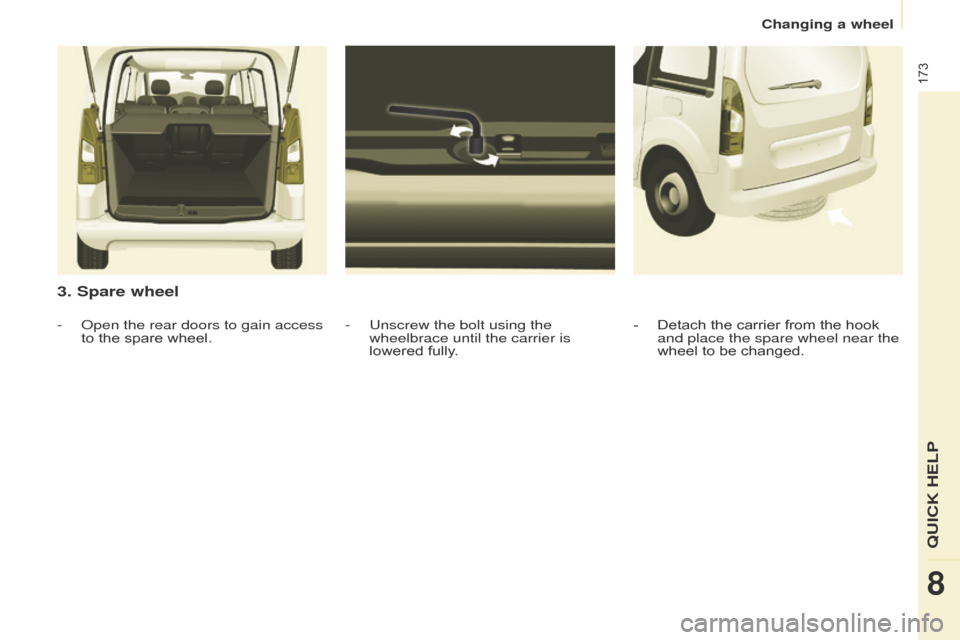
173
Berlingo-2-VP_en_Chap08_aide-rapide_ed01-2016
3. Spare wheel
- Unscrew the bolt using the
wheelbrace until the carrier is
lowered fully.
-
o
pen the rear doors to gain access
to
the
spare
wheel. -
Detach the carrier from the hook and place the spare wheel near the
wheel
to be changed.
QUICk HELP
8
Changing a wheel